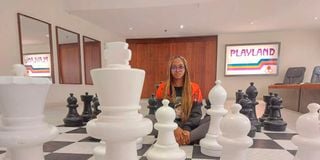Enter the Grandmaster

What you need to know:
- Madelta Glenda Nyaitondi, 21, is a fast rising chess players and the first Kenyan to win a world chess title.
- She outclassed Mozah Al-Moaamari from the United Arab Emirates, clinching 7.5 points to win the World Women’s Armature Chess Championships held last month in Greece. That was Kenya’s first world title.
- The win came with a Sh75, 984 cash prize and earned her free full board accommodation for next year’s competition.
- Mady is a pharmacy student at the University of Nairobi and an alumna of Alliance Girls High School.
- She has played chess professionally for three years, featuring in local and international tournaments.
- She looks up to Hungarian chess grandmaster Judit Polgar who achieved the title of Grandmaster at the age of 15, becoming the youngest player to do so.
1. How did you get into chess?
I was never into sports. In fact, I didn’t engage in any sports activity until 2016 when I was in high school. That’s when I got interested in chess. Most people called me a geek because I was in the mathematics club and participated in some computer projects which all together led me to the chess club. I was immediately drawn to the game because I enjoyed puzzles and looked at chess as an advanced level of puzzle solving. It was really cool because we were being trained by professionals. It was also relaxing and exciting to learn something new, so I stuck to it.
2. How do you normally practice for a competition?
Well, unlike most sporting activities, chess purely involves the mind, with just a little physical involvement. Two weeks before any tournament, I solve about 20 chess puzzles daily. It helps jog my mind and I am able to master or remaster some of my old tricks and also acquire new ones. In the beginning, I struggled a little to get my rehearsals right. Sometimes you assume that you’ll remember the right moves to make in difficult situations. I learnt that I always have to practice consistently. I also go through some of my lines before a game, which is my ritual. It gets me in the mood.
3. What are some of the challenges you have encountered in your journey?
Balancing chess with school work has been tough because I want to excel in both, and sometimes that leads to frustration. I am pursuing a degree in science, which is quite a demanding course. Secondly, I sometimes lack motivation and the discipline to practice consistently because chess is yet to be fully recognised as a sport in Kenya. That means that we have less than enough competitions, and those of us who are active have to bank on international competitions to remain consistent and also gain recognition.
4. What do you do for fun when you are not playing chess?
I am not an outdoorsy person so when I’m not playing or studying, I am usually just playing my piano, which I learnt to play when I was in primary school. It is relaxing and therapeutic for an introvert like me. Also, I make time for my friends to socialise by either chatting or watching a movie. I’m hoping to expand my social life and find new hobbies.
5. Where do you see yourself and chess in Kenya in future?
I am hoping that five years from now I will have won an international Master title, and started a chess programme for young people. I want to teach those who have just been playing casually at home how to monetise their skills, which I think is one of the things that is deeply lacking in the country. For Kenya, I think in the next five years, with good leadership and proper investment in the sport, we will have produced several international female Masters because more girls are now into chess.





